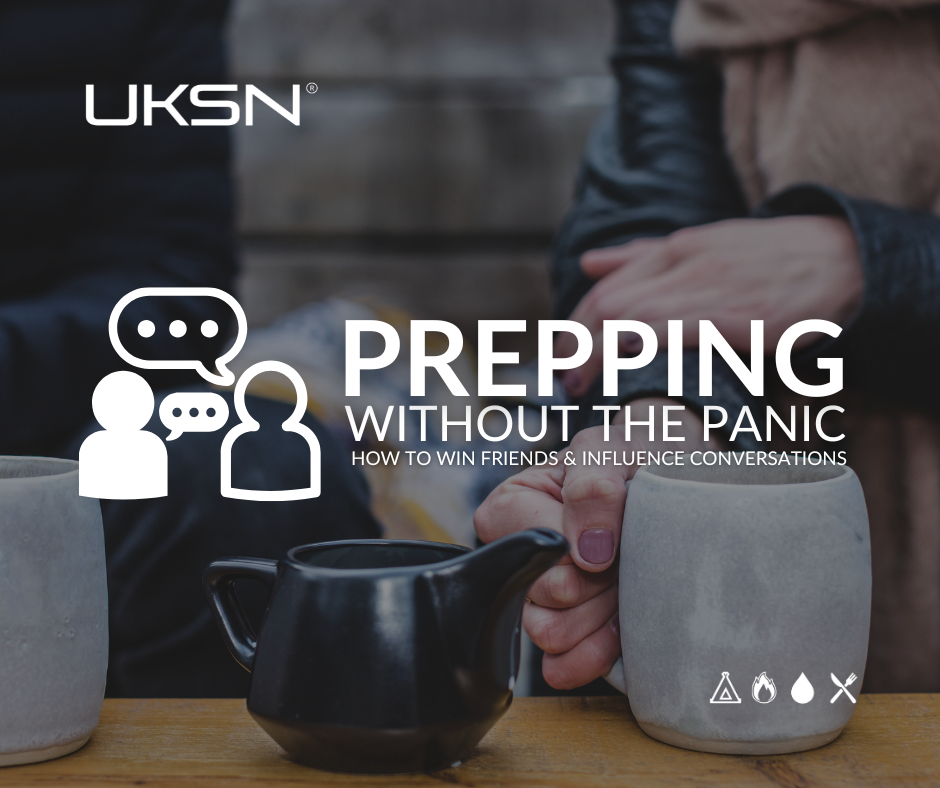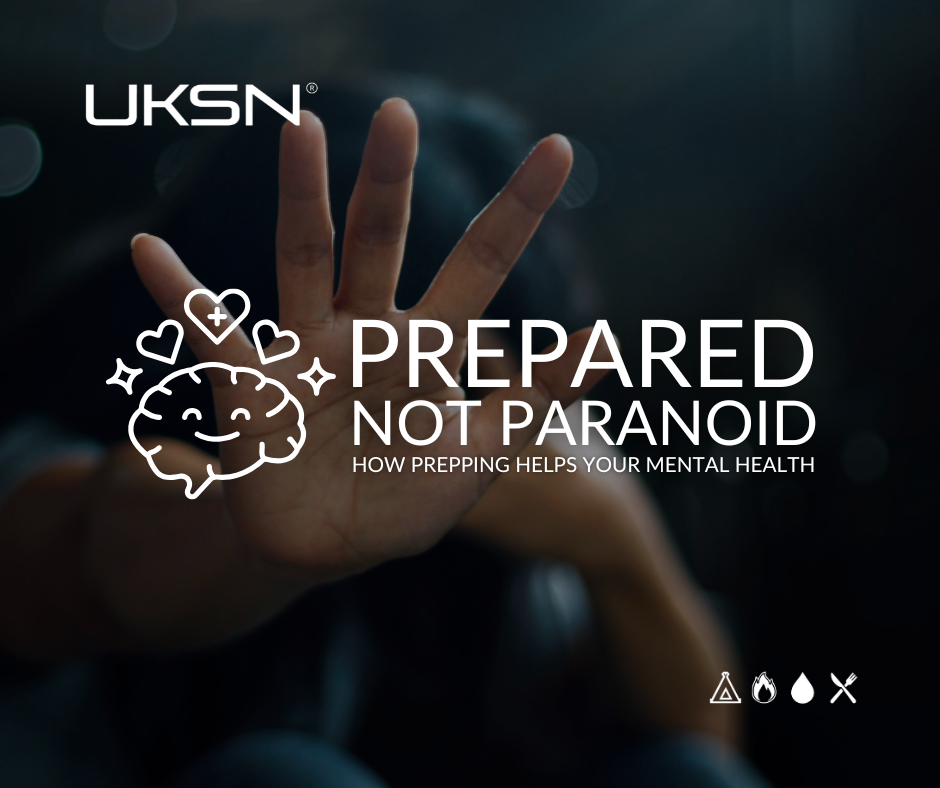Prepping Without the Panic: How to Win Friends and Influence Conversations
- UKSN

- Aug 25, 2025
- 6 min read
If you have ever tried to talk to a friend, family member, or colleague about being prepared for emergencies, you may have been met with blank stares, polite nods, or even a slightly worried look. In the UK, the word “prepping” still carries a few stereotypes, and people might picture someone hiding away in a bunker surrounded by tins of beans.
In reality, preparedness is just about using common sense to make sure you and your loved ones can cope if something goes wrong. This could be anything from a power cut, heavy snow, or a water supply issue, to a medical emergency while camping.
At UKSN, we know that being ready for life’s curveballs isn’t extreme or strange – it’s sensible. The challenge is explaining that to others without making them feel overwhelmed, judged, or alienated. This guide will help you start those conversations naturally, avoid the “tin foil hat” label, and maybe even inspire your friends to join you in becoming more self-reliant.

Understand Where They’re Coming From
Before you launch into a conversation about prepping, think about the person you’re speaking to. Do they already have some interest in outdoor activities, gardening, camping, or self-sufficiency? Or are they the type who hasn’t so much as checked the batteries in their smoke alarm in years?
People’s attitudes towards risk and preparation vary widely. Some naturally see the value in having backup plans. Others avoid thinking about potential problems because it makes them uncomfortable.
Start by asking a few casual, open-ended questions. You might say:
“Did you see that storm last winter? It knocked our power out for a bit.”
“What would you do if the water was off for a couple of days?”
“Have you ever camped somewhere with no phone signal?”
These are low-pressure conversation starters that get people thinking without you lecturing them.
Keep It Relatable
If your first sentence is about stockpiling six months’ worth of food, you’re going to lose people. Instead, bring the topic down to a relatable level.
For example:
Mention how useful it is to keep a small torch in the kitchen drawer so you can find your way during a power cut.
Talk about how a basic first aid kit in the car helped you when a child fell over at the park.
Share how having a camping stove made a rainy-day picnic possible when the barbecue was rained off.
When you focus on small, everyday benefits, prepping stops being about rare disasters and starts being about convenience, safety, and peace of mind.
Use Prepping Examples from Real Life
There’s no shortage of everyday disruptions in the UK that prove the value of preparation. Just think about:
Winter storms that bring down power lines
Flooding in low-lying areas
Transport strikes causing major delays
Water supply issues during hot spells
Localised shop shortages during bad weather
When you reference things that have actually happened here, people realise these aren’t just far-off “what if” scenarios. They’re real events that happen to real people – sometimes close to home.
Avoid Overwhelming Them
It’s tempting to share everything you know in one go, especially if you’re passionate about self-sufficiency. But dumping a list of potential disasters and gear recommendations on someone who’s new to the idea can make them switch off.
Instead, introduce the concept gradually. If you’re talking to a neighbour, maybe start with one simple action they could take – like keeping a few extra bottles of water at home. If they respond well, you can build on that in future conversations.
Think of it as planting seeds rather than delivering a full training course in one afternoon.
Focus on Positives, Not Fear
It’s easy to slip into “doom and gloom” territory when discussing why preparedness matters. While being honest about risks is important, fear isn’t the best motivator for most people.
Instead, focus on the positive side:
Preparedness gives you confidence to handle challenges.
It can save you money by reducing waste and avoiding last-minute panic buys.
It makes outdoor adventures safer and more enjoyable.
It brings a sense of achievement when you solve problems with your own skills and resources.
By framing prepping as an empowering, rewarding activity, you’ll make it sound appealing rather than frightening.
Share Your Own Journey
Telling your own story can be far more effective than giving people a lecture. Explain how you got into prepping and what inspired you to start.
Maybe you had a camping trip where you forgot something essential and decided to be better prepared next time. Perhaps you experienced a local power cut that made you realise how much we rely on modern conveniences.
When you share your personal experiences – including the mistakes you’ve made – you show that prepping is a learning process, not a competition to see who can be the most “ready.”
Invite Them to Join You
Sometimes the easiest way to get someone interested is to involve them in a practical activity. You could:
Invite them on a day hike and show them how to use a map and compass.
Take them to a UKSN event or local meet-up.
Ask them to help you build a raised bed for growing vegetables.
Encourage them to try an overnight camp in the garden with the kids.
Hands-on experiences make preparedness feel like an adventure, not a lecture.
Watch Your Language
Certain words can make people switch off or feel uncomfortable. Terms like “survivalist” or “bug-out bag” might mean something perfectly sensible to you, but they can be off-putting to someone unfamiliar with them.
Instead, use plain, friendly language:
“Grab-and-go bag” rather than “bug-out bag.”
“Emergency supplies” instead of “survival kit.”
“Backup plan” instead of “escape route.”
You’re not dumbing things down – you’re making them accessible.
Respect Their Choices
Not everyone will be interested in prepping, and that’s okay. The aim is to share your knowledge, not to pressure people into doing things they don’t want to do.
Even if they never buy a single extra tin of food, your conversation might stick with them. One day, when something unexpected happens, they might remember your advice and take action.
Keep It Fun
Preparedness doesn’t have to be serious all the time. You can make it light-hearted by incorporating it into hobbies and social activities.
For example:
Host a “lights-out” evening where you cook a meal without electricity.
Challenge friends to a camp-cooking competition using only store cupboard ingredients.
Have a garden day where everyone learns to plant something edible.
When you make it enjoyable, people associate prepping with good memories, not just emergencies.
Use Social Proof
People are more likely to be interested if they see others doing something. Mention that you’re part of a community like UKSN, where members share skills, help each other, and run events.
Hearing that thousands of other people in the UK take preparedness seriously makes it feel more normal and less “out there.”
Start Small, Grow Steadily
When introducing friends to prepping, keep the focus on easy wins:
Store an extra week’s worth of essential food.
Keep basic tools and batteries in a known location.
Learn one practical skill, like making a fire safely or filtering water.
Small successes build confidence and create momentum. Over time, those first steps can lead to a much broader preparedness mindset.
When to Step Back
Sometimes, despite your best efforts, someone just isn’t interested. They might change the subject, laugh it off, or dismiss it outright. That’s fine.
Prepping is a personal choice, and pushing too hard can damage relationships. You’ve planted the seed – leave it there and focus your energy on people who are open to learning.
Why This Matters More Than Ever
In recent years, events like extreme weather, supply chain issues, and public health crises have shown how quickly normal life can be disrupted. The people who cope best aren’t the ones with the biggest stockpiles, but the ones who planned ahead and stayed calm.
Talking to friends about prepping isn’t about convincing them the world is ending – it’s about helping them see that a little forward thinking can make life smoother, safer, and less stressful when things go wrong.
Final Thoughts
Prepping in the UK doesn’t need to be dramatic or complicated. It’s about taking sensible, practical steps to make sure you and your loved ones can handle everyday challenges and unexpected events.
By keeping conversations friendly, relatable, and focused on the positives, you can help others see that preparedness isn’t strange – it’s simply part of taking care of yourself and those around you.
The more people understand this, the stronger our communities become. And who knows – your next conversation might be the one that inspires someone to start their own preparedness journey.
If you want to learn more, meet like-minded people, and develop your skills in a supportive environment, UKSN offers events, resources, and a welcoming community of over 3,000 members across the country. Whether you’re brand new to prepping or already have experience, there’s a place for you here.

.png)






Comments